On 2nd February, the Equality and Human Rights Commission (EHRC) took the unusual step of publishing a statement on Twitter “in response to allegations surrounding the integrity of our Commissioners”.
This followed an onslaught of criticism from LGBT+ and human rights organisations. The EHRC statement, which makes no admission of error, is unlikely to satisfy many critics. For the real issue isn’t about the personal integrity of individual Commissioners: it’s about the competence of the EHRC to act as a regulator on equality issues.
The EHRC is the successor organisation to the Commission for Racial Equality, and its first chairman was the former head of the CRE, Sir Trevor Phillips. Despite his distinguished CV, Phillips has become a controversial figure in the equalities circles, particularly for his opposition to multiculturalism and his views on Islam (he famously wrote that “we have ‘understood’ too much, and challenged too little”).
In 2020 he was suspended from the Labour Party over accusations of Islamophobia.
Prior to 2010, the EHRC had 425 members of staff and a budget of £62m.
Under the Tories, funding was stripped to the bone. In 2020 its budget was £17.4m, of which over £12m was spent on administration costs, including the wages of its 206 members of staff.
This is all very much what one would expect from a right-wing government with no commitment to tackling endemic inequality in society and a good reason to be fearful of a powerful equalities regulator.
Back in 2005, the old CRE had published a damning report into Britain’s police, showing that they were still riddled with racism. As the organisation shrank, it became weaker and less effective.
In 2019 a Women and Equalities Select Committee report slammed the EHRC for not using its enforcement powers to ensure that employers and public authorities complied with their duties under the Equality Act.
It fell to an American publication, Newsweek, to reveal how deeply the rot had set in. Newsweek reported that the ten Commissioners (in 2020) included no black or Muslim members. In 2012 a decision was made not to reappoint Baroness Meral Hussein-Ece, who at the time was the only Muslim commissioner, and Lord Simon Woolley, who was the only black commissioner.
Woolley told Newsweek
“Our job as commissioners was to do exactly what they were supposed to do, to raise the fundamental issues of tackling race inequality in education, in health, in employment, within the criminal justice system and I saw that as my central role, but it was made very quickly aware to me that that strong voice was not wanted. They [the Government] didn’t want the voices that challenge the big structural inequalities.”
Sir Geoffrey Bindman QC added.
“When the old commission for racial equality was in existence, I was its legal adviser for many years, it conducted a number of cases that were bought by individuals to the county courts and employment tribunals, complaining and challenging discrimination. We took a number of cases even as far as the House of Lords, through the judicial system, challenging discriminatory practices for example by working men’s clubs by local authorities, on a whole range of issues, we see very little of that from the EHRC.”
In 2020 the EHRC published a high profile report into antisemitism within the Labour Party. Of the many issues that the Women and Equalities Committee had raised, this wasn’t one of them. But, noting high levels of “public concern” the Commissioners chose to target Labour over its compliance with the Equality Act, rather than any public bodies.
The investigation prompted a number of accusations of political bias, not least from Labour Party members. However, Labour’s General Secretary David Evans banned any criticism of the EHRC within the Party: “motions or discussions that seek to question the competence of the EHRC to conduct the investigation in any way, or repudiate or reject the report or any of its recommendations are not competent business and must be ruled out of order.”
The EHRC themselves in their latest statement, absolve themselves of any political bias – “We are an independent, statutory body. Our Board is appointed through the standard public appointment process.” In fact, they’re appointed by the Minister for Women and Equalities, assisted by a recruitment panel. Since 2019 this Minister has been Liz Truss, and she’s made a series of highly controversial appointments.
These and other appointments have led many to believe that Liz Truss is on a personal crusade to use the EHRC to fight culture wars rather than challenge the actual discrimination in society.
These fears have been amplified in the last 12 months by the approach that the EHRC has been taking on questions relating to trans rights.
The EHRC intervened in support of anti-trans activist Maya Forstater’s employment tribunal appeal; however, in commenting on the appeal judgment, Baroness Falkner said that “people who celebrate this ruling must be obvious that this is not licence to behave badly”.
Not long after this, Falkner was defending Kathleen Stock’s right to free speech, saying that “I wouldn’t describe her views as transphobic.”
So the chair of the EHRC is unable to recognise transphobia when it’s staring her in the face?
In the past 12 months, we now know that EHRC Commissioners have held a series of meetings with the leaders of two anti-trans hate groups, Kate Harris and Bev Jackson of LGB Alliance and Nicola Williams of Fair Play for Women.
The EHRC are unapologetic – “on trans rights issues, we operate an open-door policy and will listen to and engage with stakeholders with a wide range of differing and opposing views.”
But this is disingenuous.
Just because they’re keen to talk about trans issues doesn’t make the LGB Alliance any more of a stakeholder than someone shooting their mouth off in a pub. They call themselves an LGB group, but many believe they have done any significant work to support the LGBT+ community, and have recently issued a statement accusing all LGBT+ groups in the country of being homophobic!
The reporter Ben Hunte claims that there’s been a collapse of morale at the EHRC, which has already led to several resignations. According to one ex-employee:
“When I started in 2018, we were all celebrating LGBT rights and the EHRC was pushing to make the UK better for LGBT people. It’s like working for a different organisation now.” Another former staff member told Hunte that “one paper was so heavily edited by Falkner that it left people speechless. She changed the case studies, the language… It was so transphobic, there was no way it would get published. Falkner is incompetent when it comes to LGBT rights… She’s come in and shown a complete disregard for the huge amount of expertise in the organisation.”
Jolyon Maugham of the Good Law Project confirms the accuracy of this report – “I am directly aware of considerable numbers of staff who want to leave the EHRC or are considering their positions. I have also heard shocking stories of the EHRC taking political direction from No.10.”
The crisis came to a head in January 2022 when the EHRC released two statements, one of them recommending that any ban on conversion therapy in the UK should be limited to sexual orientation and exclude gender identity, and the other calling on the Scottish Government to delay any reform to the Gender Recognition Act to allow time for further consultation.
Ben Hunte tells us that “some EHRC staff complained about these statements in December, at least one month before they were released. The employees flagged their ‘serious concerns’ to senior management, including the Chair and the Board. Those who spoke up were subsequently locked out of their computers and faced disciplinary action.”
As Nicola Sturgeon pointed out, the EHRC’s new stance on GRA reformGRA Reform Gender Recognition Reform Bill - Scotland https://www.gov.scot/news/gender-recognition-reform-bill/ Published 03 March 2022 09:34 Part of Equality and rights Simplifying how trans people apply for a Gender Recognition Certificate. See Also https://mermaidsuk.org.uk/mermaids-manifesto-for-gra-reform/ https://www.stonewall.org.uk/what-does-uk-government-announcement-gender-recognition-act-mean was in contradiction to the EHRC’s own submissions to the 2019 consultation, though the legislation itself, and the reasons behind it, hadn’t changed. The EHRC said that “our work is informed by evidence” – but it seems to be very selective about what “evidence” it wants to hear.
Besides ignoring the views of its own staff, the EHRC seems to have taken little account of the opinions of LGBT+ and human rights groups, who have roundly condemned the statements.
Though this has turned into a trans rights debate, it’s abundantly clear that the problems within the EHRC run far more profound than a few Commissioners with gender critical sympathies.
The willingness of the EHRC to concentrate its energies on culture wars and to serve a right-wing agenda weakens the fight for equality on every front. The EHRC has a responsibility as a regulator to promote equality and human rights and to ensure compliance with the law.
It is no longer fit for purpose, and the sooner that people understand this, the better.
This opinion article was authored by Linda Wall @WirralLinda




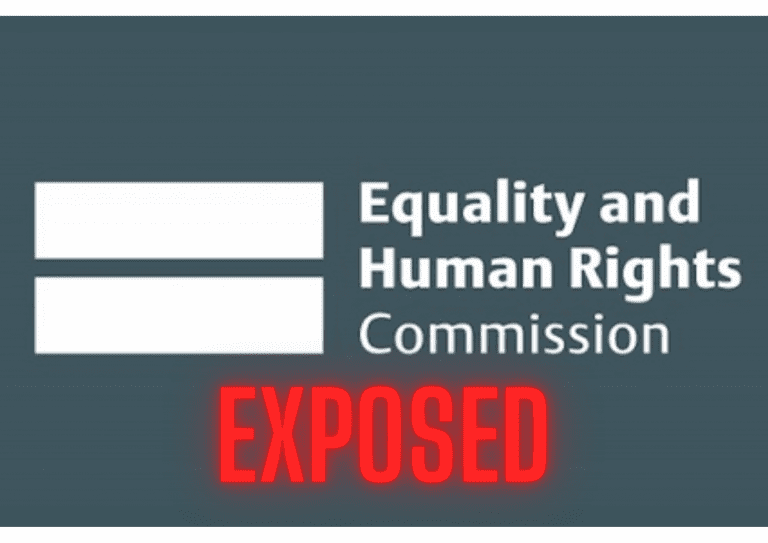

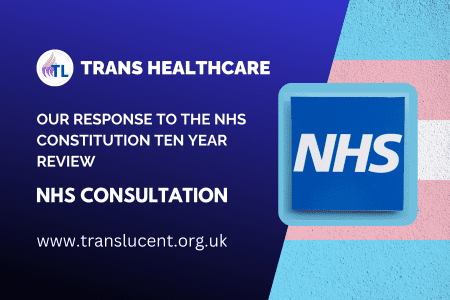
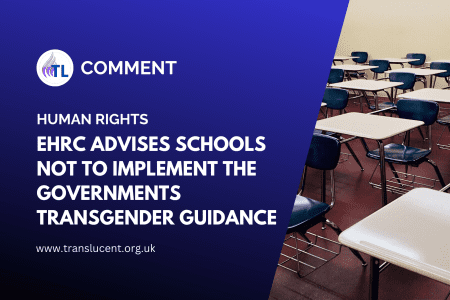

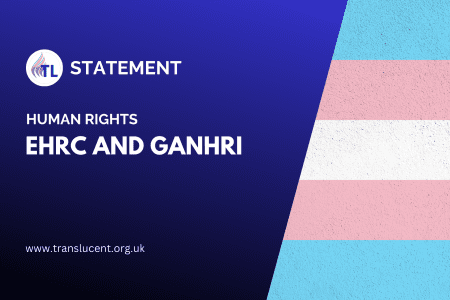
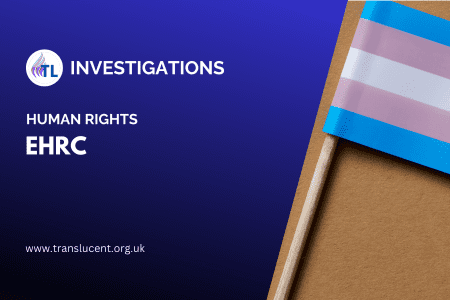
 To provide the best experiences, we use technologies like cookies to store and/or access device information. Consenting to these technologies will allow us to process data such as browsing behaviour or unique IDs on this site. Not consenting or withdrawing consent, may adversely affect certain features and functions.
To provide the best experiences, we use technologies like cookies to store and/or access device information. Consenting to these technologies will allow us to process data such as browsing behaviour or unique IDs on this site. Not consenting or withdrawing consent, may adversely affect certain features and functions.